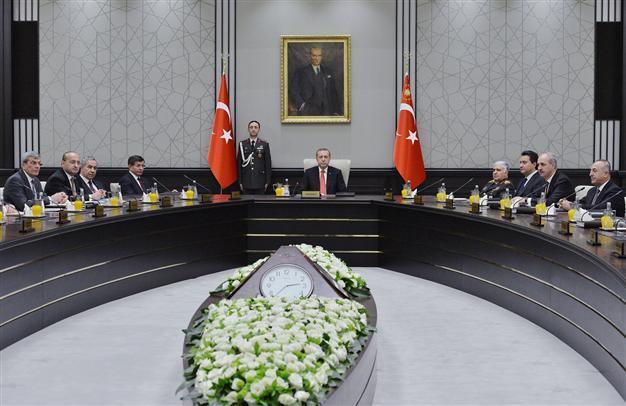National Security Council under Erdoğan updates top secret national security ‘book’
ANKARA

DHA Photo
President Recep Tayyip Erdoğan has apparently taken another step in his fight against ally-turned-foe, U.S.-based Islamic scholar Fethullah Gülen, with Turkey’s top national security body finally amending its top-secret national security document, in line with the threat allegedly posed by Gülen’s followers.
A written statement released late on April 29, after an almost seven-hour-long meeting of the National Security Council (MGK), did not explicitly make it clear whether the Gülen movement, referred to by both the president and government officials as the “parallel state,” was included in the amended version of the document, known as the “Red Book.”
“The National Security Policy Document [MGSB], which has been updated by taking changes in the environment of domestic and external security into consideration, was discussed. It has been decided that the advisory jurisdiction on this issue will be declared to the Council of Ministers,” said the statement, released after a regular bimonthly meeting of the top body, which brings together Turkey’s top civilian and military leaders.
Members of the MGK were briefed in detail concerning “the parallel state structure,” it stated. “Detailed information concerning the fight against the parallel state structure and illegal formations were presented and emphasis was put on resuming the fight with determination,” it added.
The “Red Book” national security document lists Turkey’s perceived domestic and external threats, and is updated by the MGK when necessary. It was last updated in 2010.
In a previous meeting held on Oct. 30, the MGK publicly documented the Gülen movement as one of the leading threats against the country’s national security.
In remarks delivered just a few hours before he chaired the MGK meeting on April 29, President Erdoğan used a meeting staged to promote projects by the Food, Agriculture and Livestock Ministry as an opportunity to loudly hint at new measures against followers of the Pennsylvania-based Gülen. He repeatedly described Gülenists in the country as “a gang of treachery.”
“Today, Turkey is at the threshold of a critical period. We are facing a lot of threats, from separatist terror to the parallel gang of treachery,” Erdoğan said on April 29, referring to the outlawed Kurdistan Workers’ Party (PKK), which Turkey lists as a terror organization along with the “parallel state.”
“Those who are annoyed by Turkey’s embrace with its siblings in the region have surrounded our sphere with a ring of fire. We very well know what is being done and for what reason. We also well know who is behind it and what it wants,” he added.
Erdoğan also vowed to fight against the “parallel state” during a speech in Ankara on April 30.
“[There are those who] want to divide our country, burn our flag, and inject viruses in our state, such as parallels. Yesterday, we decided in an advisory jurisdiction to include this issue in the National Security Policy document… We sent it to the government. No compromise will be given to those [Gülenists] from now on,” said Erdoğan.
Over the weekend, speaking to reporters during his return from an official visit to Kuwait, Erdoğan had indicated that the MGK meeting would be dominated by the fight against the purported “parallel structure.” He also noted that his office had drafted certain measures and sent it to the government.
‘Genocide’ statements ‘null and void’
Meanwhile at the April 29 meeting, the MGK also maintained that statements and decisions made by some countries and organizations labeling the mass killings of Anatolian Armenians during the World War I as genocide are “null and void” for Turkey, since they are made with “political” motives and not based on historical reality.
The statement, meanwhile, also noted that election security in the run-up to the June 7 parliamentary election was on the agenda during their meeting, with council members briefed about measures to be taken against “incidents that might threaten public order and security.”
